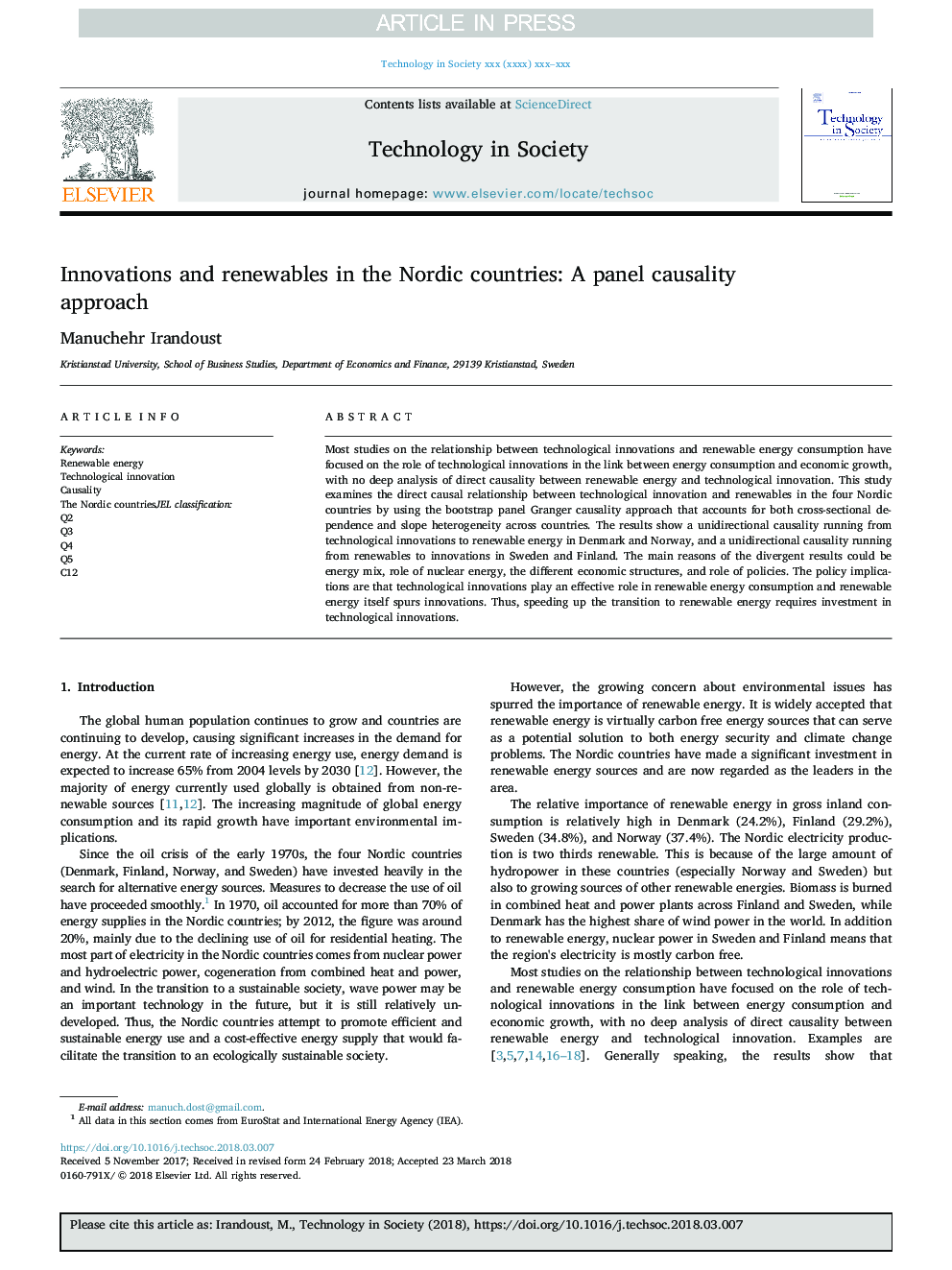| کد مقاله | کد نشریه | سال انتشار | مقاله انگلیسی | نسخه تمام متن |
|---|---|---|---|---|
| 6851410 | 1436805 | 2018 | 6 صفحه PDF | دانلود رایگان |
عنوان انگلیسی مقاله ISI
Innovations and renewables in the Nordic countries: A panel causality approach
ترجمه فارسی عنوان
نوآوری ها و انرژی های نوآورانه در کشورهای شمال اروپا: یک رویکرد علیه پانل
دانلود مقاله + سفارش ترجمه
دانلود مقاله ISI انگلیسی
رایگان برای ایرانیان
کلمات کلیدی
ترجمه چکیده
بیشتر مطالعات مربوط به ارتباط بین نوآوری های تکنولوژیکی و مصرف انرژی تجدید پذیر بر نقش نوآوری های تکنولوژیکی در ارتباط بین مصرف انرژی و رشد اقتصادی متمرکز شده اند، و هیچ تحلیل عمیقی از علت مستقیم بین انرژی های تجدید پذیر و نوآوری های تکنولوژیکی ندارند. این مطالعه رابطه مستقیم بین نوآوری های تکنولوژیک و انرژی های تجدید پذیر را در چهار کشور شمال آفریقا با استفاده از رویکرد علیت روابط پورت بوت استرپ بررسی می کند که برای هر دو نوع وابستگی متقابل و ناهمگنی شیب در کشورهای متفاوت است. نتایج نشان می دهد که علیت ناشی از نوآوری های تکنولوژیکی به انرژی های تجدید پذیر در دانمارک و نروژ، و یک علیت یک جهته از انرژی تجدید پذیر به نوآوری در سوئد و فنلاند است. دلایل اصلی نتایج متفاوتی می تواند ترکیب انرژی، نقش انرژی هسته ای، ساختارهای مختلف اقتصادی و نقش سیاست ها باشد. پیامدهای سیاست این است که نوآوری های تکنولوژیکی نقش مؤثری در مصرف انرژی تجدیدپذیر ایفا می کنند و انرژی های تجدید پذیر خود را نوآوری می کنند. بنابراین، سرعت انتقال به انرژی تجدیدپذیر نیاز به سرمایه گذاری در نوآوری های تکنولوژیکی دارد.
موضوعات مرتبط
علوم انسانی و اجتماعی
مدیریت، کسب و کار و حسابداری
کسب و کار و مدیریت بین المللی
چکیده انگلیسی
Most studies on the relationship between technological innovations and renewable energy consumption have focused on the role of technological innovations in the link between energy consumption and economic growth, with no deep analysis of direct causality between renewable energy and technological innovation. This study examines the direct causal relationship between technological innovation and renewables in the four Nordic countries by using the bootstrap panel Granger causality approach that accounts for both cross-sectional dependence and slope heterogeneity across countries. The results show a unidirectional causality running from technological innovations to renewable energy in Denmark and Norway, and a unidirectional causality running from renewables to innovations in Sweden and Finland. The main reasons of the divergent results could be energy mix, role of nuclear energy, the different economic structures, and role of policies. The policy implications are that technological innovations play an effective role in renewable energy consumption and renewable energy itself spurs innovations. Thus, speeding up the transition to renewable energy requires investment in technological innovations.
ناشر
Database: Elsevier - ScienceDirect (ساینس دایرکت)
Journal: Technology in Society - Volume 54, August 2018, Pages 87-92
Journal: Technology in Society - Volume 54, August 2018, Pages 87-92
نویسندگان
Manuchehr Irandoust,
